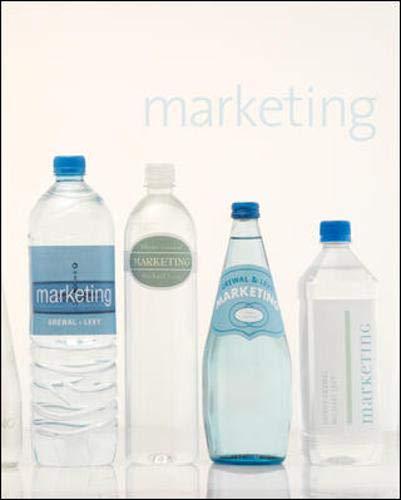In 2001, Gary Hirshberg entered into a partnership with the multinational French corporation Groupe Danone after he
Question:
In 2001, Gary Hirshberg entered into a partnership with the multinational French corporation Groupe Danone after he had already built his organic Stonyfield Farm yogurt business from a small farm intended to fund his nonprofit ventures to a vast company with annual sales of $83 million. Three years later, with sales approaching $100 million, Groupe Danone increased its holding from 40 percent to 85 percent while maintaining Hirshberg as President and CEO.
A major reason for the company’s rapid growth and popularity was its responsiveness to consumer demands for organic, natural food products. Stonyfield’s popular yogurt and other products represented healthy alternatives to other brands, giving it a differential advantage in a marketplace in which more and more consumers had become choosier about the food products they bought. The company also supports various socially and environmentally beneficial causes. Because it provides superior value to consumers, Stonyfield Farm enjoys the number one market position for organic yogurt and is the number three branded yogurt in the industry.
Company History In 1983, founders Gary Hirshberg and Samuel Kaymen started Stonyfield as an organic farming school to help revitalize New England agriculture and educate people about the environmental practices of local dairy farmers and the issues they face. Hirshberg and Kaymen began making high-quality yogurt as a way to raise money for their nonprofit school. Building on this tradition of environmental education, the company made pioneering social and environmental business practices central to their business, values, and growth. Essential to this goal is helping consumers realize the impact of their various purchases on the environment.
The Product The company produces all natural and certified organic yogurts, smoothies, soy yogurt, frozen yogurt, ice cream and milk. Their products contain no gelatins, artificial colors, artificial flavors, or other chemical additives used in many other brands. Stonyfield Farm yogurts contain inulin, a natural dietary fiber that helps boost calcium absorption, and six live active cultures that together enhance digestion, fortify the body’s natural defenses, improve the absorption of nutrients and decrease the presence of harmful bacteria. The result: A healthier, better tasting product appreciated by health-conscious consumers.
Walking the Talk Stonyfield’s environmental initiatives center on two major themes: consumer education and modeling successful approaches of socially and environmentally responsible business practices.
Ongoing consumer efforts include an educational campaign that presents the company’s support for organic products, endorsement of humane animal treatment, and support of health and environmental initiatives. It models its principles of environmental sustainability through its efforts to use environmental packaging and extensive recycling practices, and its award winning efforts around climate change. Furthermore, it addresses both themes by donating 10 percent of its profits to organizations that protect and restore the planet.
In September 2000, the company launched its first national print advertising campaign (Exhibit C4.1), featuring celebrities perceived as positive role models. In the ads, these high-profile individuals spotlighted both environmental and social causes, in addition to endorsing Stonyfield Farm’s products. Beginning in 2002, the company rolled out more traditional ads that featured its major selling point: organic products. The company launched its first national campaign in 2003, using a combination of television, radio, and print ads that communicate that the products are organic and good for the consumer and that the company has a sense of humor and a mission51 (Exhibit C4.2).
Engaging Consumers Stonyfield considers getting consumers involved a major key to its success. Although consumers appreciate the company’s healthful approach to its products, they also like becoming empowered via the company’s programs.
One such program was “Vote for the Future,” in which customers were asked to sign the back of a yogurt lid in support of sustainable energy policies. The lids were delivered to Washington, DC, and customers who signed lids were entered into a “Flip your Lid” contest that featured energy-efficient products and kits as prizes.
Stonyfield’s social and environmental focus draws both positive recognition and the according financial benefits. Sales of Stonyfield products experienced double-
digit, compound annual growth from $3 million in 1990 to $211 million in 2005. These positive results, in combination with the fulfillment of its company objectives, enable Stonyfield to present itself as both an environmentally responsible and profitable company.
Questions 1. Many of Stonyfield Farm’s green initiatives are costly and time consuming. Do you think they are worth it?
2. Is Stonyfield Farms reacting to what its customers want, or is it helping customers define what they want?
Step by Step Answer:






